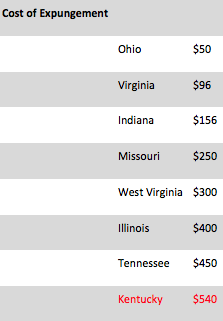
The U.S. has made enormous progress in criminal justice reform this last year with the passage of the First Step Act in December of 2018. The momentum for reform continues in the states.
With an eye towards reducing recidivism, and making sure former non-violent offenders are able to become contributing members of society, states are tackling civil asset forfeiture, occupational licensing reform, and making the expungement process easier and cheaper.
“Clean slate,” expungement focused measures are intended to make it more straightforward and simple for former offenders to get convictions removed from their record, or to have old nonviolent records sealed.
In Kentucky, Senate Bill 57, introduced by Senators Jimmy Higdon (R-14) and Gerald Neal (D-33), would allow discretionary expungement of Class D felonies with a ten-year waiting period. It is important to note that this does not include violent or sexual offenses, offenses involving a child, and public corruption offenses.
The bill would also lower the filing fee from $500 to $150. Currently, Kentucky has one of the highest costs of expungement, $500 for the filing fee, and a $40 certification (see chart below). The bill was introduced on January 8, has made it through the Rules and Judiciary Committees, and will be brought to the floor for a vote on Tuesday, March 12.

A “Clean Slate” bill also was heard in the Utah statehouse: House Bill 431, sponsored by Representative Eric Hutchings (R-Kearns). This bill would identify people who are eligible and put them on an automated track to a clean slate by expunging certain misdemeanor crimes. This bill has earned bipartisan support and backing from the Salt Lake County District Attorney’s Office, Utah Department of Public Safety, and more. HB 431 passed the House, made it through the Senate Committee on Judiciary, Law Enforcement, and Criminal Justice, but was not voted on in the Senate before session ended.
Lastly, Wisconsin lawmakers are also advancing similar sister bills in the State Assembly and Senate, Assembly Bill 33 and Senate Bill 39. Both bills had respective public hearings this week. These bills make common-sense revisions to Wisconsin’s outdated expungement laws and make it easier for former convicts to connect with potential employers. This will be especially valuable to employersduring a time while almost every industry in Wisconsin is experiencing a workforce shortage.
The Badger Institute in Wisconsin released a report on the problems with Wisconsin’s expungement laws, and possible solutions to let Wisconsin judges help ex-convicts in the job seeking process. The report found that the state’s expungement laws were largely ineffective because judges are tasked with making the decision during sentencing rather than after completion of the defendant’s sentencing, when rehabilitation is more apparent.
The purpose of expungement itself is to reward those that have successfully completed their sentence and remained crime-free. If a former felon is serious about their repentance and rehabilitation, their prior mistakes, with some exceptions, should not be holding them back from being a contributing member of society. Too often, criminal records bar ex-convicts from re-entering society by way of job or home ownership, for example, and they get trapped in the same cycle of crime.
Charging high fees and having arbitrarily long waiting times for ex-convicts to receive expungement also defeats the purpose and does nothing to increase public safety or trust in the criminal justice system. The Kentucky bill is a great start, but the bill currently establishes a 10-year waiting period, when in reality, there is no evidence that a 10-year waiting period better protects public safety than a 5-year waiting period.
These bills allow for second chances. There should always be exceptions, based on the degree of the crime, but one mistake on an former offenders criminal record should not bar them from jobs, housing, or dignity for the rest of their lives – and when it does it makes it far more difficult for them to positively contribute to society.

